 Petzlover
Petzlover Goldador is originated from United States but Scottish Deerhound is originated from United Kingdom. Goldador may grow 20 cm / 7 inches shorter than Scottish Deerhound. Goldador may weigh 14 kg / 30 pounds lesser than Scottish Deerhound. Goldador may live 6 years more than Scottish Deerhound. Goldador may have less litter size than Scottish Deerhound. Both Goldador and Scottish Deerhound requires Low Maintenance.
Goldador is originated from United States but Scottish Deerhound is originated from United Kingdom. Goldador may grow 20 cm / 7 inches shorter than Scottish Deerhound. Goldador may weigh 14 kg / 30 pounds lesser than Scottish Deerhound. Goldador may live 6 years more than Scottish Deerhound. Goldador may have less litter size than Scottish Deerhound. Both Goldador and Scottish Deerhound requires Low Maintenance.
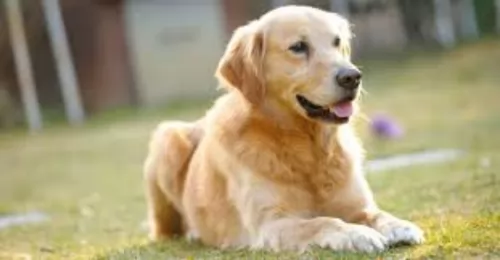 Introduced as a designer dog, the Goldador is beautiful – a mix between Golden Retrievers and Labrador Retrievers, two of the most popular dog breeds in the world.
Introduced as a designer dog, the Goldador is beautiful – a mix between Golden Retrievers and Labrador Retrievers, two of the most popular dog breeds in the world.
The dog was specifically bred to be an excellent working dog, and in fact today he makes the most wonderful guide-, rescue- and therapy dog.
Known also as Golden Labradors, the Goldador is a dog that has many capabilities, one of which is to make a wonderful family pet. As a designer breed, the dog isn’t recognized as a standardized breed by any of the major kennel clubs.
 The Scottish Deerhound is considered the Royal Dog of Scotland. It is a sighthound that is large and bred to hunt large Red Deer. They are similar in appearance to the Greyhound, but they are bigger and heavier. Closely related to the Irish Wolfhound, they were used in creating it. The Scottish Deerhound is an ancient breed that is now very rare. It can trace its lineage to the 16th and 17th centuries.
The Scottish Deerhound is considered the Royal Dog of Scotland. It is a sighthound that is large and bred to hunt large Red Deer. They are similar in appearance to the Greyhound, but they are bigger and heavier. Closely related to the Irish Wolfhound, they were used in creating it. The Scottish Deerhound is an ancient breed that is now very rare. It can trace its lineage to the 16th and 17th centuries.
The Deerhound was a favorite of hunting nobility and could not be kept by any person or household that did not have at least the rank of earl. Despite this history the Scottish Deerhound was not considered separate from the Highland Greyhound and other staghounds until the 19th century. They were bred to stalk or “course” the red deer and were used extensively for this purpose until the beginning of the 20th century. At that time there was a need for smaller, slower deer tracking dogs.
At the start of the 20th century, the land for deer hunting had grown smaller and so had the deer. Also, the invention of the rifle made the fast Deerhounds who could cover large tracks of ground in minutes, no longer a necessity for successful hunting. As the clan systems fell and the nobility rose, the Deerhounds became the dog for nobility and landowners. There were a few non-nobilities who also kept them and hunted with them. As they were less needed for hunting a few households kept them as show dogs.
In the United States and Canada, both the Scottish Deerhound and the Greyhound were used for hunting wolves and deer. In Australia, the Kangaroo Dog – a deerhound crossbreed, and Deerhounds were used to hunt wild boar, emu and kangaroos. The Deerhound is one of the oldest of the breeds that are Greyhound-like. The Deerhound is not as fast as the Greyhound if they are running on a smooth surface. Get them on a rough surface and the will out that Greyhound. They appear to be larger and rougher than they really are. This gives them an advantage over the lighter, smaller Greyhound.
The Deerhound was a contributor to development of the Irish Wolfhound toward the end of the 19th century.
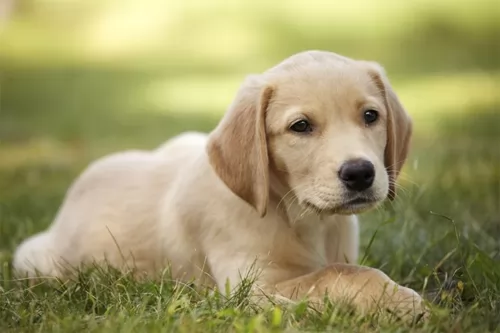 The Goldador is a large muscular dog standing at between 56 – 61cm in height at the withers and weighing between 27 – 36kg in weight.
The Goldador is a large muscular dog standing at between 56 – 61cm in height at the withers and weighing between 27 – 36kg in weight.
His double coat is short and smooth but in can also be longer. It comes in shades of gold or yellow with hints of red, but it can be liver or black too. Goldadors are well-balanced dogs, and just the look in their kind brown eyes makes you realize that this beautiful dog can make a wonderful pet.
He has a well proportioned head with medium length floppy ears, a black nose and a long tail.
Loving, intelligent, loyal and playful, the Goldador is the kind of dog that gets on well with everyone. It’s why he isn’t a particularly good watchdog as he is just too friendly with strangers. You have to be careful though – his rambunctious nature, his energy and playfulness can see him being a bit rough around small children or the elderly. It is why socialization and training are so important for him as then he becomes obedient and more relaxed around everyone.
He loves his human family and never wants to be left on his own for too long. Intelligent and alert, he is an easy dog to train as he makes it easier by being a dog that wants to please.
 The Scottish Deerhound looks a lot like the Greyhound, except it is heavily boned and larger in size. The Deerhound is also different in several other ways. Instead of the Greyhound, the Scottish Deerhound is more closely related to the Irish Wolfhound than the Deerhound. The Deerhound is a large, rough coated breed. It is a very tall breed; in fact, it is the tallest of all sighthounds.
The Scottish Deerhound looks a lot like the Greyhound, except it is heavily boned and larger in size. The Deerhound is also different in several other ways. Instead of the Greyhound, the Scottish Deerhound is more closely related to the Irish Wolfhound than the Deerhound. The Deerhound is a large, rough coated breed. It is a very tall breed; in fact, it is the tallest of all sighthounds.
The Deerhound has a long head with a flat skull and a muzzle that tapers at the end. They have dark eyes and a scissor bite with a tail that can be either curved or straight. The hair on their tails almost touches the ground. The rest of its coat is wiry and harsh with a beard, mustache and mane. The ears are soft and can be either held semi erect or folded against their head. Their coat is gray or grey-blue today but in the past, it might have been brindle, red fawn or yellow.
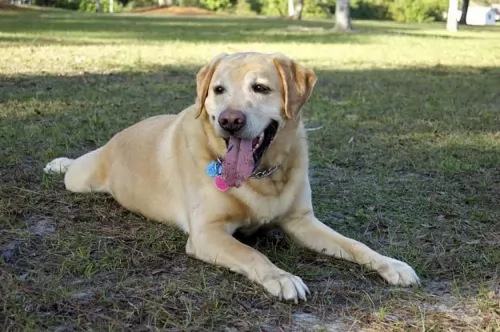 Goldadors are intelligent dogs and they’ve been used extensively for guide- and therapy dogs, loving to be useful and busy. Its the kind of dog that thrives in a loving, active family – one that counts him in as a family member.
Goldadors are intelligent dogs and they’ve been used extensively for guide- and therapy dogs, loving to be useful and busy. Its the kind of dog that thrives in a loving, active family – one that counts him in as a family member.
He makes an exceptional family pet and companion and you can rely on him to be a loyal, loving pet.It’s why the Goldador is becoming such a sought after pet – he simply ticks all the right boxes.
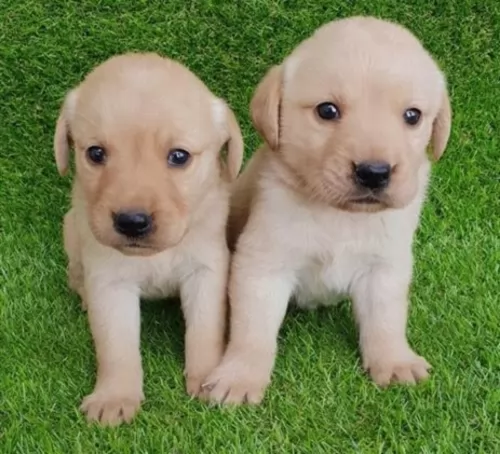 Goldadors luckily don’t have many health issues, and as a hybrid, he has fewer health issues than pure breds.
Goldadors luckily don’t have many health issues, and as a hybrid, he has fewer health issues than pure breds.
You can say with confidence that a nutritious diet, regular exercise, good grooming, lots of love and attention and visits to the vet if your pet is ill are key aspects for maintaining good health.
There are always going to be some common health problems that your Goldie could get -
You’ll need to be checking your Labrador Retriever's floppy ears. They don’t get as much air in them as a dog with erect ears. A dog like the Goldador with floppy ears will need to have his ears cleaned for bacteria. Be very careful how you clean your pet’s ears as you can damage them if you probe too deeply.
Did you know that by spaying or neutering your Goldador can save them from getting some serious illnesses later on? Speak to your vet about it when your pet reaches 9 months to a year of age.
Goldadors can easily put on weight if they aren’t given enough daily exercise to burn off the calories. Some put on weight after being spayed or neutered and it's important to watch their weight after these procedures. Being overweight puts a lot of extra strain on a dog’s internal organs.
 The Scottish Deerhound does face some serious challenges on the health front. These include:
The Scottish Deerhound does face some serious challenges on the health front. These include:
• Cystinuria – recessive disorder that causes an inability for cystine to be filtered from the urine.
• Gastric Dilatation Volvulus – otherwise known as bloat and it can be life threatening if not treated quickly.
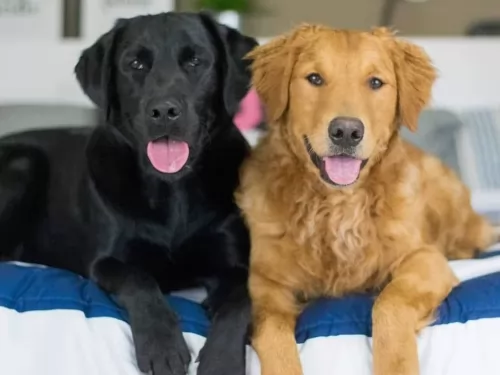 Goom your Goldador regularly. He can either have short- or long hair, but he is a fairly low maintenance dog so a good brush twice a week to remove loose hairs will be good for him.
Goom your Goldador regularly. He can either have short- or long hair, but he is a fairly low maintenance dog so a good brush twice a week to remove loose hairs will be good for him.
Diet is everything, and by giving your Goldador nutritional food, you can actually lengthen his life. If you’re going to be giving him commercially manufactured food, follow the feeding guidelines on the packaging. Remember there are foods that cater specifically for a dogs age and his energy levels.
Try and give him some home-made food from time to time such as cooked rice, vegetables and chicken as well as some raw meat occasionally as this can ensure his skin and coat remain healthy.
Always provide plenty of cool, fresh water, especially seeing that he will be thirsty after a long walk or other exercise. Dehydration in a dog can be fatal.
Provide your Goldador with a warm, dry place to sleep. Make sure that it offers shelter from the sun and rain and also provides shade.
 1.Feeding the puppy – Feed a high quality large or x large puppy dogfood at least 3-4 times a day. Do not overfeed.
1.Feeding the puppy – Feed a high quality large or x large puppy dogfood at least 3-4 times a day. Do not overfeed.
2.Feeding the adult – Feed a high-quality adult large or x large dog food once or twice a day. Do not overfeed.
4. Games and Exercises – The Deerhound needs plenty of exercise in a safe place where they have plenty of room to run. A small yard or life on a leash are not enough for this energetic breed. Play fetch, course running, Like the Greyhound they will be couch potatoes if you let them but that will hurt their health. Lure Coursing or hare coursing are good. Coyote hunting. Find space where they can run for the joy of running. Never force them to run – like along a bicycle